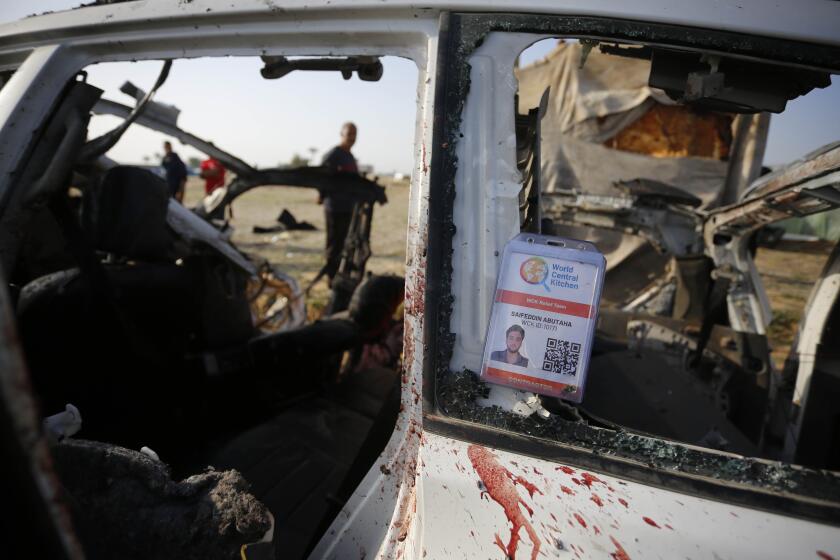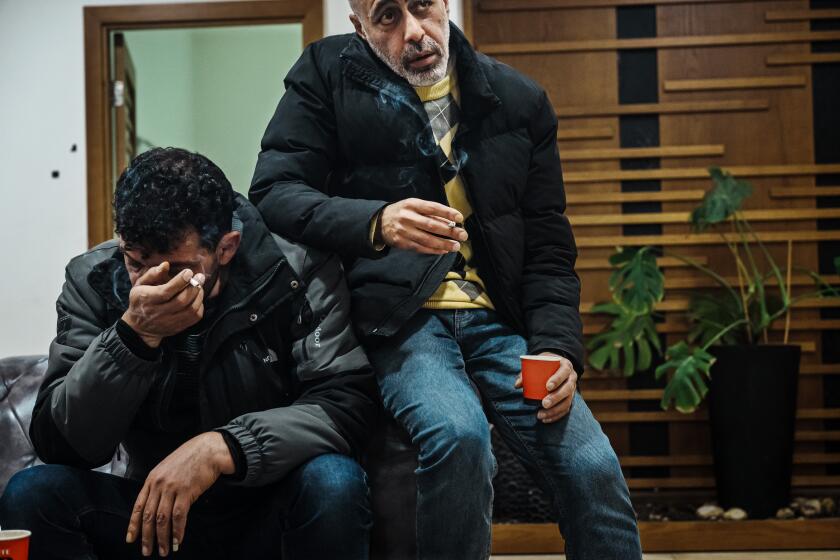News Analysis: Netanyahu faces massive protests in Israel. Could the war in Gaza be his undoing?

- Share via
JERUSALEM — Massive street demonstrations that last year posed the most serious threat to date to Prime Minister Benjamin Netanyahu, and then quieted after the Oct. 7 attack, have returned in full force. Tens of thousands of Israelis are once again filling the nights in Jerusalem and Tel Aviv with calls for Netanyahu to resign.
But with the context different now — Israelis and Palestinians are locked in ferocious warfare — have Netanyahu’s chances for political survival also changed?
The Houdini of Middle Eastern politics must now escape forces closing in from multiple fronts: the left, the right, ultra-Orthodox religious, the business community, even some families of Israeli hostages seized by Hamas militants.
And this time Netanyahu is less able to fall back on U.S. support as he engages in an unusually bitter, unusually public spat with the Biden administration.
Anyone who has studied Israeli politics for more than two seconds knows that Netanyahu, Israel’s longest-serving prime minister, has managed to survive a long string of seemingly career-ending crises. His latest election in 2022, for example, came even as he stood trial for numerous corruption charges. Betting against him, as one commentator put it, is like betting against the house.
Still, the pressure on Netanyahu now is more intense than any in recent memory. Demonstrators’ demands include immediate elections aimed at dumping Netanyahu and his radical right-wing coalition government, something the prime minister insists would be dangerous during a war.
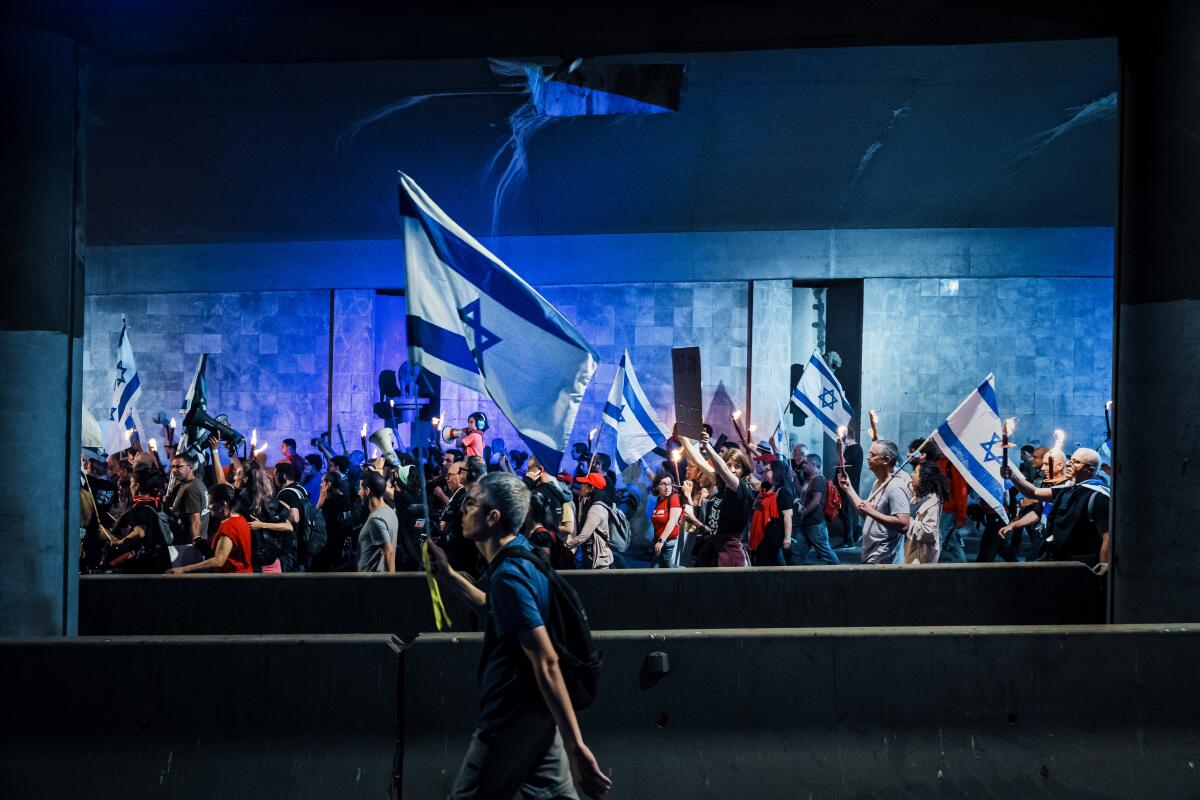
“The call for elections now, a moment before victory, would paralyze Israel for at least half a year,” Netanyahu said last weekend. “It would paralyze the negotiations for freeing our hostages, it would bring the war to an end before its goals are completely achieved, and the first that would welcome this is Hamas, and that tells you everything.”
Religious Zionists, most believing in a divine right to govern, now have outsize influence in Israel. The war in the Gaza Strip is energizing their settlement push.
While last year’s demonstrations — unprecedented at the time — were triggered by Netanyahu’s efforts to weaken the Israeli judiciary, today’s added fuel is the government’s failure to free the hostages and what many see as mishandling of the war in the Gaza Strip. The conflict has dragged on for nearly six months and killed more than 200 Israelis and more than 32,000 Palestinians, the majority of them women and children. Israel launched its offensive in retaliation for the Oct. 7 cross-border attack that killed around 1,200 people in southern Israel.
Meanwhile, in the streets of Jerusalem and Tel Aviv since Saturday night, the protest rallies have grown in size to include tens of thousands of people, many chanting or waving signs saying “Netanyahu is guilty” and “Free our country.”
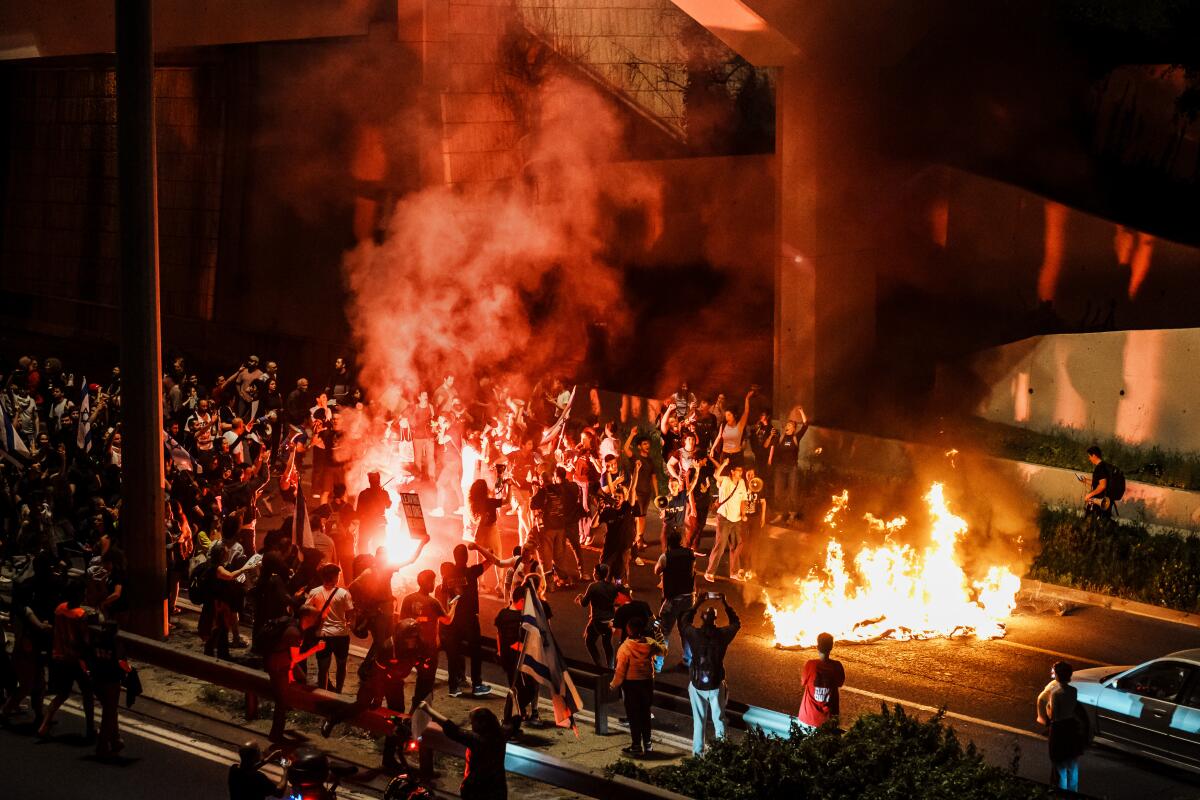
At one street corner in Jerusalem, near the Knesset, or parliament, sat a larger-than-life model of a blue voting box with an imitation ballot saying, “Changing directions.” And in an unusual act for Israel, several hundred protesters have set up a tent city in the heart of the holy city.
Staffers from World Central Kitchen, chef José Andrés’ humanitarian aid group trying to get food to Palestinians in Gaza, were killed in Israeli airstrikes.
“I believe that both the Israeli people and the Palestinian people are being held hostage by horrible leadership,” said Elana Kaminka, a 49-year-old California native whose son, an officer in the Israeli army, was killed in the initial Hamas assault. She joined the rally in Jerusalem. “This government is dangerous. ... This government is acting against the interest of the Israeli people. And the Palestinian people.”
On Wednesday, a group of activists invaded the Knesset while it was in session. The demonstrators shouted slogans, waved pictures of hostages and smeared windows with yellow paint before being dragged out by security agents. A handful of opposition legislators waved support for the demonstrators.
Two elements distinguish the new wave of protests compared with those last year. One is the presence of relatives and supporters of some of the 100 or so hostages in Gaza. Early on, many thought it was not the time to challenge the government, which was engaged in negotiations to free the men, women and children. Now, after months of desperate frustration, many — but not all — have abandoned that fear and joined the rallies and marches.
The second is represented by a group called Brothers in Arms, reserve army soldiers and officers who oppose Netanyahu and especially his moves to allow ultra-Orthodox men to avoid mandatory military service. Last year, several senior retired officers joined the opposition to Netanyahu, but the numbers have swelled.
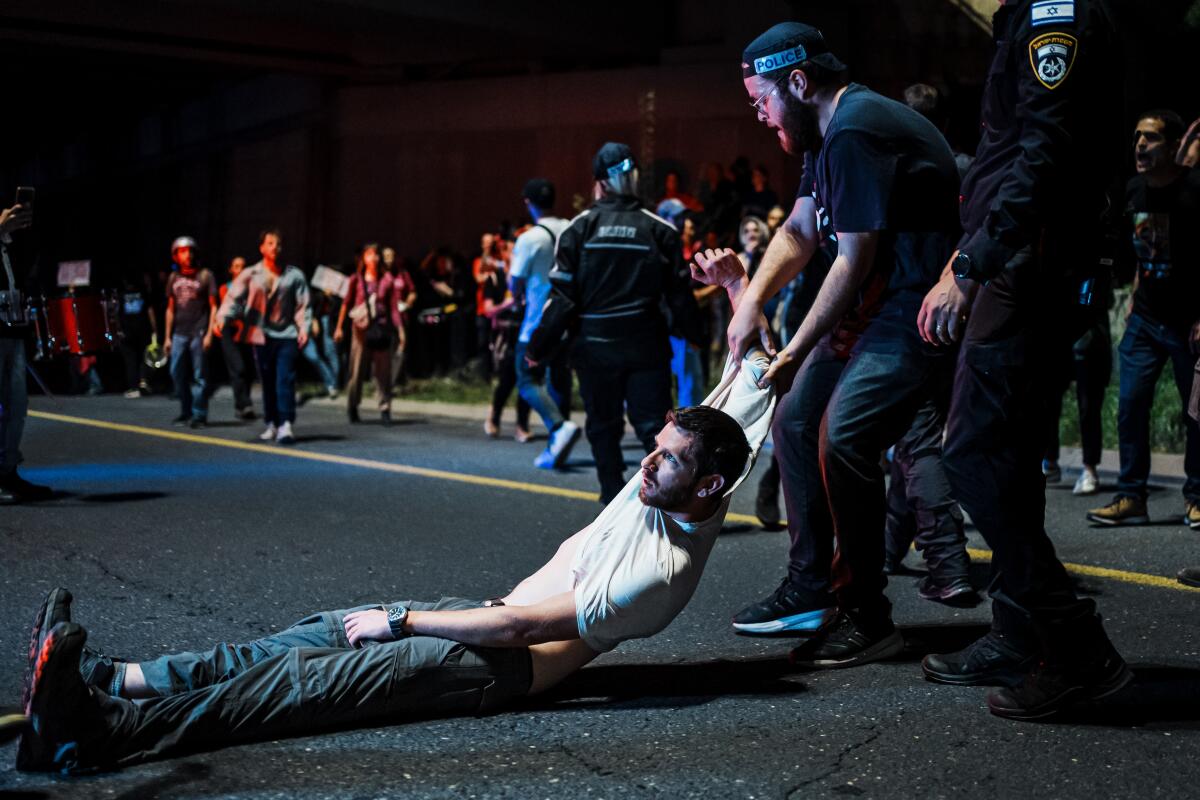
Nir Shaish, a former paratrooper who fought in one of Israel’s wars with Lebanon, joined the demonstration Tuesday primarily to demand that the government “pay whatever the price” to bring the hostages home. But the issue of the religious avoiding military service — mandatory for all Israeli citizens, men and women — added to his fury.
With family trapped in Gaza, two Palestinian friends in the West Bank hold each other up amid crushing grief.
A law was scheduled to go into effect this week that would require conscription of ultra-Orthodox men, or haredim, who have largely avoided such service until now. Several ultra-Orthodox men are in Netanyahu’s coalition government and threatened to walk out if the law was enacted. It has been put on pause for now.
The ultra-Orthodox “say that prayers are saving more than someone in the military unit,” Shaish said. “We want them to participate in military service. Equal rights [means] equal duties.”
Like the vast majority of Israelis, Shaish, 65, said he initially believed the war was justified. But now, he said, it’s being used by Netanyahu as a “tool for survival.”
Polls show Netanyahu to be wildly unpopular, with belief in his credibility and handling of the war sinking.
Even as his domestic support plummets, Netanyahu has tested the loyalty of Israel’s strongest ally, the U.S. government.
He has consistently rejected or ignored the advice and warnings given to him by senior U.S. officials on how to conduct the war, especially their pleas to avert civilian casualties as Israeli bombs kill thousands of noncombatants, including aid workers and journalists.

He embarrassed Secretary of State Antony J. Blinken by announcing the largest project in years of Jewish settlements in the West Bank while Blinken was in Israel on an attempt to revive diplomacy. Most of the world considers such settlements erected on land claimed by the Palestinians to be illegal, and the Biden administration has repeatedly urged a halt to them.
Last week when the U.S. took the highly unusual step at the United Nations of allowing passage of a resolution calling for an immediate cease-fire, Netanyahu threw a fit. Israel opposes an immediate cease-fire, as did the U.S. until recently.
And when Benny Gantz, a more centrist member of Israel’s so-called war Cabinet, announced he was making a trip to Washington for official meetings, Netanyahu ordered him to cancel it. Gantz went anyway and was warmly greeted by senior U.S. officials, including the secretaries of Defense and State. The Biden administration seemed keen to underscore that there are alternatives to Netanyahu.
Analysts said Netanyahu is acting deliberately to antagonize the Biden administration as a distraction from a war that, aside from nearly obliterating large parts of the Gaza Strip, has taken an enormous economic and psychological toll domestically. If that is the case, it is a risky gamble, as Israel is heavily dependent on Washington for weapons, money and other support.
“The factors that could spark early elections in Israel are multiplying and growing stronger,” said Nimrod Goren, writing for the Middle East Institute in Washington, including “messages from top American officials that change in Israel is needed.”
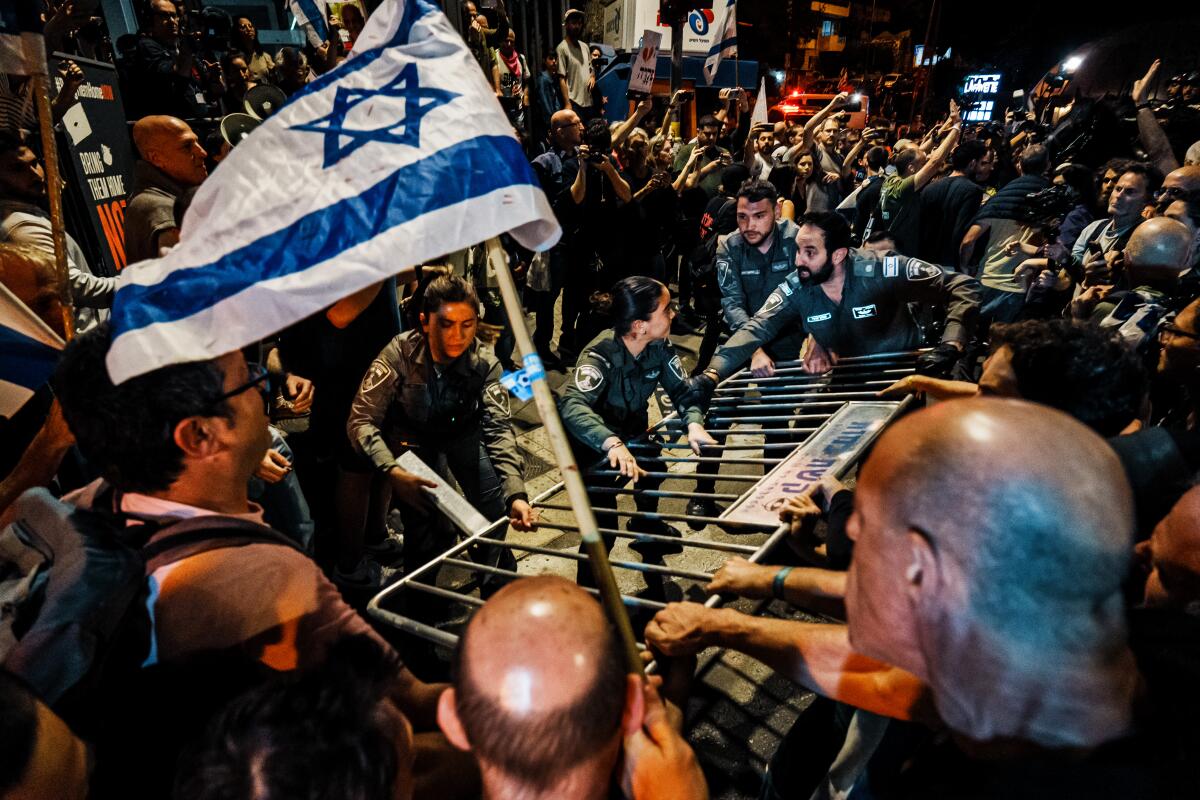
Even if the current government falls and there are new elections, it remains unclear what kind of difference a new government would make. Or what that would mean for Netanyahu. Israel had five elections in four years and almost always ended up with Netanyahu.
As Goren noted, “Netanyahu’s skills at political survival should not be underestimated. In previous times of potential political crisis, Netanyahu repeatedly showcased his ability to take control of political events.”
Wilkinson reported from Washington and Yam from Jerusalem.
More to Read
Sign up for Essential California
The most important California stories and recommendations in your inbox every morning.
You may occasionally receive promotional content from the Los Angeles Times.

